DAVE'S DIARY - 10 FEBRUARY 2020 - KELSEY WALDON CD REVIEW
KELSEY WALDON – KENTUCKY 1988 AND BEYOND
“I can hear the gravel split from a mile away/ got the hell out of Dodge in Mama's S-10 Chevrolet/ and I was much too young to be in the middle back then/ but now Daddy's talking to us with bloodshot eyes again/ he's saying things he don't mean to say/ maybe he should be alone today/ but I still love him anyway/ Kentucky, 1988.” - Kentucky 1988 - Kelsey Waldon.
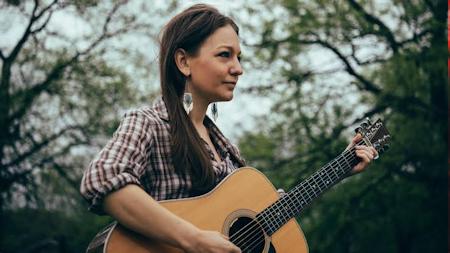 |
Since releasing her third album White Noise/White Lines she also has her name etched on the tiny town's entry sign.
“As a Kentuckian, I grew up seeing signs like this all over my beloved home state - ‘Home Of' Merle Travis, Bill Monroe, Loretta Lynn, Keith Whitley, Ricky Skaggs, Dwight Yoakam, Patty Loveless, Tom T Hall, all of Country Music Highway 23' and countless others,” Kelsey revealed.
“Add this to the list of proud moments. Thank-you Ballard County officials for making it happen. It means a lot.”
There's plenty of theories how the town got its curious name.
Ballard County is shaped like a monkey's head and Monkey's Eyebrow is where the eyebrow would be, or that the shape of the town kind of looks like an eyebrow from a nearby hill, or that the local general store back in the day was only considered good enough for “a bunch of monkeys” and the name stuck.
So Waldon moved to Nashville and studied songwriting at Belmont University before she released three albums.
She produced White Noise, White Lines with Dan Knobler at Goosehead Palace studio in Nashville.
Kelsey injects more specific details of her adolescence in Ballard County in her 10 original songs on her album released here on April tourist John Prine's Oh Boy label, distributed by Cooking Vinyl.
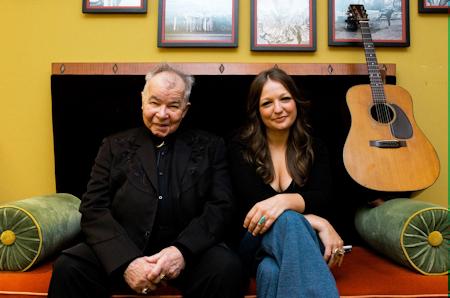 |
She was Prine's first album signing in 15 years.
“I'm really crazy about Kelsey's voice,” explained Prine who is touring here with John Paul White.
“It reminds me of Tammy Wynette. Not the sound, but the way that it has such vulnerability and years of experience in it. Every time I sing with her I find myself looking over and thinking, ‘there's really something special here.'”
Waldon said she was inspired by Pikeville coal miner's daughter and country singer Patty Loveless.
"Patty was definitely a huge influence. I saw a lot of myself in her, especially as a young girl from Kentucky that loved music and loved country music," Waldon revealed.
"It was like, wow, she can do it. That means maybe I can do it, being where I'm from."
Waldon describes her Kentucky, 1988 as her Coal Miner's Daughter and story of her life.
"I just didn't really have my Coal Miner's Daughter," Waldon explained.
"People might think they know me but they don't know the details of my upbringing. I hadn't written that song yet. It was kind of staple of the record. This one felt like it was a closer glimpse into the story of my life and the way I feel about everything."
It's heavily about forgiveness and understanding and realization that struggle touches everyone.
For Waldon, that was making peace with the people who raised her.
“Your parents are not perfect people,” Waldon confessed.
“They are just as troubled and beautiful as the rest of us. I wouldn't be the way I am now without them, even with the terrible things. I have a perspective now, and it takes a really mature person to have forgiveness, to say you love somebody even if they don't say they are sorry. For better or worse, this is my stock.”
Waldon sings about her father Ricky in Kentucky 1988 - his voice appears on the record in an interlude, taken from a voicemail he left after hearing his daughter on the local radio.
“He's a talented dude,” Waldon revealed.
“He owns a hunting lodge and all, but he's won barbeque competitions, he carves wood, he can paint. There are so many misunderstandings about rural people in general.”
She added a Chickasaw Nation of Ada , Oklahoma , chant recorded on her mobile phone at her father's hunting camp on her title track.
Waldon spent the 2017 solar eclipse with members of the Chickasaw Nation listening to Merle Haggard and talking about how they, too, are so misunderstood.
FATAL BLACK PATCH WEEDS
“I worked my whole life for them boys overseas/ but they never cared much for the likes of me/ lost all my crops, lost my family/ killed my brother over filthy weed/ black patch, black patch, fire in the hole/ black patch, black patch, rolling smoke black patch, black patch, unravelling time/ I'd die for the black patch, out of my mind.” - Black Patch - Kelsey Waldon.
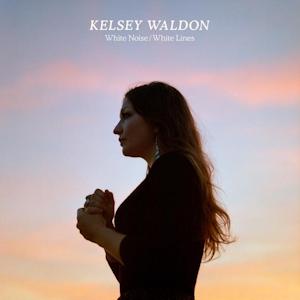 |
Waldon joins Loretta Lynn, Patty Loveless, Tyler Childers and Chris Stapleton as Kentucky born country torch bearers. She was born poor in a mostly forgotten region, and as a woman and traditionalist in the country genre, insists on doing it her own way and depicting adversity from personal experiences. Waldon impregnates memories of her physical toiling and dogged perseverance on the Western Kentucky farms and tobacco fields into her album narratives. |
She paints that picture from entrée Anyhow, featured on Nu Country TV on February 1, that segues into childhood memories in her title track and mixed emotions in paternal paean Kentucky 1988.
Waldon injects more social comment about the fate of both the workers in the dark cured tobacco crops and loss of their families and farms to major companies in Black Patch.
Kelsey revealed the major tobacco companies took over the fields from family farmers and the previous owners who rebelled by burning the crops in the 1904 Black Patch Tobacco War - a period of civil unrest when Kentucky farmers rose against a monopolistic tobacco company.
"It's also a song about sticking up for local farmers," Waldon explained.
"It's a story about big tobacco coming in and manipulating the prices and kind of destroying the businesses of these local farmers. In a way, it's talking about economic pressure as well. But I had always wanted to write a story about that and it's a story that's very specific to the region that I'm from."
She also explores a former partner's addiction as an escape from romance in the heartbreak fuelled Run Away.
And it's the solace of mountain music that triumphs over the materialistic competition that dominates the daily news cycle and mania in her acoustic delivery of Lived And Let Go.
BAPTIST BELLES RING SUNDAY'S CHILDREN
“Sunday's children are being lied to/ has anybody told you?/ Sunday's children are being lied to/ has anybody told you?/ take away what we think we know/ let the nothingness show/ leave that bullshit alone/ be aware of what we say and do/ a better world for me and you.” - Sunday's Children - Kelsey Waldon.
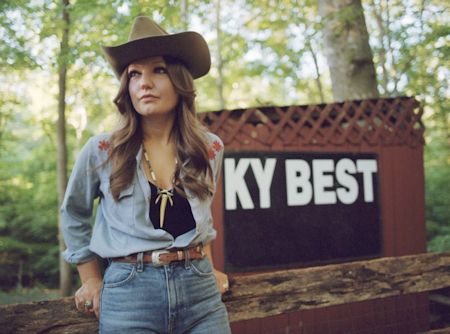 |
Waldon was raised in the Southern Baptist church and Sunday's Children is a song about the warping of religion in the name of hate.
“We all want the same things, we all dream the same dreams,” she sings.
“Don't have to be just like you to understand universal truth.”
But she has reservations.
“So many of my gay and lesbian friends grew up made to feel they were wrong for being who they are,” Waldon explained. “That they're wrong, they should repent, they should pray. Some of these white supremacy movements are backed by religion, and it's all just really absurd to me. Sometimes you are so extreme in your beliefs, you can't see any other way. You put your ‘religion goggles' on. But some people haven't liked the song, and that's OK. I realized the people who have been offended by it, though, might be those people.
"I think you can find God in just being your truest self. It doesn't always have to have rules. It doesn't always have to have this judgment or this self-righteousness. It's really about being humble and aware. It's a song of love, I think, and honestly, it was very much a stream of consciousness. I didn't mean to sound like a preacher. A lot of times I have to write songs to make sense of things to myself."
VERY OLD BARTON – KENTUCKY STRAIGHT BOURBON WHISKEY
“My life is a song, my mind's a picture show/ you are the real thing when you are alone/ drinking Very Old Barton with the country radio/ always lonesome and won't let it go.” - Very Old Barton - Kelsey Waldon
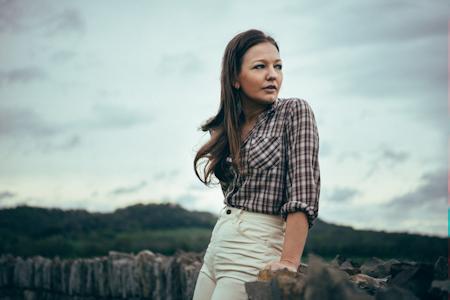 |
She follows Sunday's Children with Very Old Barton.
It eulogises solace listening to country radio with Kentucky Straight Bourbon Whiskey produced in Bardstown, Kentucky, and aged four or six years by the Sazerac Company at its Barton Distillery.
Waldon closes the album with a cover of banjo player and Appalachian mountain singer Ola Belle Reed's My Epitaph.
She didn't plan on including a cover on the record, the song took on a special meaning while she was on tour in Montana.
"We were driving down this highway out in the middle of nowhere. There was all this ash floating around in the sky from these wildfires," Waldon recalled.
"Everyone was asleep in the car and I was definitely having a moment where -- it just gets scary. I felt very alone in a way. Like, what is going to happen to me, what's going to happen with my career? Is this even going to work out? And my Ola Belle CD was playing in the van and that song came on and I just had this calming peace come over me. I was just like 'I don't care what happens. This is what I'm meant to do. This is what I'm gonna do.'"
She's also a big fan of singing actor Dolly Parton, now 74, who was born in a one-room cabin on the banks of the Little Pigeon River in Pittman Centre - a very small community in Sevier County in the Great Smoky Mountains of East Tennessee .
“Dolly is still unmistakable country, but you see all types of people at her shows,” Waldon says of the star who also established the Dollywood theme park in Pigeon Forge.
“Country-ass people, gay couples, people who love good music. You just see everybody.”
Waldon has deep traditional appeal to roots country fans.
“Hopefully people realize I am a lot more than a one-dimensional person,” says Waldon whose album features twin fiddles from 10 String Symphony members Rachel Baiman and Christian Sedelmye and Brett Resnick on pedal steel guitar.
But her West Kentucky roots prevail.
"I think that will probably come across no matter what I do - no matter how many records I make,” Waldon revealed.
“ Kentucky is just a very inspirational place. It's a very special place, culturally. I feel like it's also misunderstood by the rest of the world in a way. I wanted to show the beauty in that as well and maybe some of the ugly - because that's life. It's all about balance. Kentucky will always be an inspiration to me. It doesn't leave you."